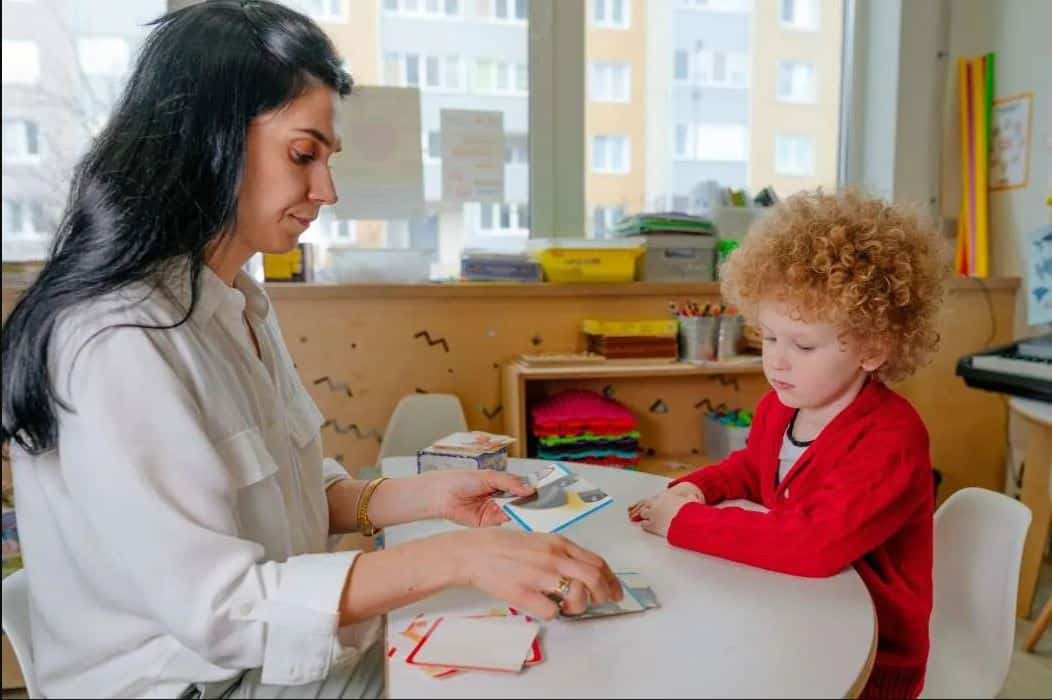For parents of children with autism spectrum disorder (ASD), understanding how ABA therapy and executive functioning work together can open new doors for their child’s development. At Move Up ABA, we recognize that executive functioning skills play a crucial role in daily life, and we’re here to help you understand how our specialized support can make a difference. Let’s explore this important topic together, starting with the basics.
What Are Executive Function Skills?
Before diving into specific treatments and strategies, it’s important to understand what we mean by executive functioning. These skills represent the mental processes that help us plan, focus, remember instructions, and manage multiple tasks. Think of these skills as your child’s brain’s command center – they’re essential for both academic success and daily living.
Let’s explore these crucial cognitive processes in detail, examining how each one appears in everyday situations:
Success Stories
“Move Up ABA has been a lifeline for our family. Before starting therapy, our son struggled with daily routines and communication. Now, he’s more independent and even initiated a conversation with a classmate for the first time! The progress we’ve seen in just six months is truly remarkable.”
- Emily R., Silver Spring, Accountant
“As a single dad, I was overwhelmed trying to manage my child’s behavior. The Move Up ABA team not only provided amazing support for my little girl but also taught me practical strategies to use at home. Their in-home sessions fit perfectly with our busy schedule. I’m so grateful for their patience and expertise.”
- Michael T., Rockville, Middle School Teacher
“We were hesitant about starting ABA therapy, but Move Up ABA’s approach put us at ease from day one. Our twins have made incredible strides in their social skills and self-regulation. The therapists are like extended family now, and we couldn’t be happier with our decision to work with them.”
- Aisha and James L., Simpson, Police Officers
Ready to start your child's journey to success? Schedule a free consultation today! 📞 Call (410) 497-8865.
Working Memory
Working memory is the ability to hold information in mind and use it to complete tasks. This fundamental skill affects nearly every aspect of daily life.
Real-life examples:
Remembering a three-step instruction like “Get your backpack, put your homework inside, and place it by the door”
Following a recipe while cooking
Keeping track of game rules while playing
Remembering a phone number long enough to dial it
Flexible Thinking

Building on working memory, another crucial skill is flexible thinking. This skill involves adapting to new situations, switching between tasks, and seeing things from different perspectives.
Real-life examples:
Accepting a change in routine, such as having a substitute teacher
Finding alternative solutions when a preferred toy is unavailable
Transitioning between activities, like moving from playtime to homework
Understanding that others might have different opinions about favorite foods or games
Self Control
While flexible thinking helps us adapt, self control helps us regulate our responses. This vital skill involves the ability to resist impulses and think before acting.
Real-life examples:
Waiting for their turn on the playground slide
Raising their hand instead of calling out in class
Resisting the urge to grab a toy from another child
Following safety rules even when excited or frustrated
Emotional Regulation
Closely connected to self control is emotional regulation. This skill helps children recognize, understand, and manage their emotions appropriately.
Real-life examples:
Using deep breathing when feeling frustrated with homework
Taking a break when feeling overwhelmed during social situations
Expressing disappointment with words instead of tantrums
Finding appropriate ways to celebrate success without becoming overexcited
Executive dysfunction predicted 57 % of the variability of autism symptoms in preschoolers.
Time Management
As children develop better emotional control, they can focus on practical skills like time management. This involves understanding how long tasks take and planning accordingly.
Real-life examples:
Getting ready for school within the allocated morning routine time
Breaking homework sessions into manageable chunks
Understanding that certain activities (like video games) need time limits
Planning ahead for longer projects or assignments
Task Initiation
Finally, bringing all these skills together enables effective task initiation – the ability to begin tasks independently and in a timely manner.
Real-life examples:
Starting homework without being repeatedly prompted
Beginning morning routines independently
Getting started on chores without constant reminders
Preparing for bedtime when told it’s time
The Connection Between Autism and Executive Functioning

Now that we understand these fundamental skills, let’s explore why they’re particularly important for children with autism. Research has shown that children with autism often present unique challenges in executive functioning. A recent study by Ko et al. (2024) found that preschoolers with ASD showed significantly lower executive function scores compared to their typically developing peers, highlighting how these differences reflect underlying neurodevelopmental differences.
How We Build Executive Function Skills Through ABA Therapy
Let’s explore the specific strategies we use to develop each executive function skill. Our approach combines evidence-based techniques with engaging activities that children enjoy.
Working Memory Development
To strengthen your child’s ability to hold and use information, we employ several proven strategies:
Using visual schedules and checklists to provide concrete memory support
Breaking down multi-step instructions into manageable pieces
Playing memory-building games that make learning fun
Practicing sequence activities to build information processing skills
Flexible Thinking Support
Building on memory skills, we help children develop mental flexibility through:
Introducing planned changes to routines in a supportive way
Teaching problem-solving strategies for unexpected situations
Practicing perspective-taking activities to broaden thinking
Using social stories to explain different scenarios and outcomes
Self Control Enhancement
As flexible thinking improves, we focus on developing self-control through:
Teaching waiting strategies that children can use independently
Using timer activities to make waiting concrete and visual
Practicing turn-taking games in fun, structured settings
Implementing reward systems that reinforce controlled behavior
Emotional Regulation Techniques
Connected closely with self-control, emotional regulation develops through:
Creating emotion identification charts for better self-awareness
Teaching practical coping strategies for different emotions
Using calm-down corners as safe spaces for regulation
Practicing mindfulness activities appropriate for children
Time Management Practice
With better emotional control, children can focus on developing time awareness through:
Using visual timers to make time concrete and understandable
Creating daily schedules that build routine awareness
Teaching clock-reading skills in practical contexts
Breaking down tasks into timed segments for better planning
Task Initiation Support

Bringing together all previous skills, we help children start tasks independently through:
Creating clear start-up routines that become natural habits
Using visual prompts that gradually fade as skills improve
Teaching planning strategies that make starting easier
Implementing “first-then” schedules for clearer expectations
Our Comprehensive Assessment and Support Framework
Thorough Assessments
Before implementing any strategies, we begin with comprehensive evaluation:
Conducting detailed assessments using the Behavior Rating Inventory of Executive Function (BRIEF)
Understanding your child’s unique profile of strengths and challenges
Identifying specific areas for focused intervention
Creating baseline measurements for tracking progress
Task Analysis and Visual Supports
Building on assessment insights, we create structured support systems:
Developing clear visual schedules that guide daily activities
Creating detailed task analysis charts for complex skills
Implementing visual supports that promote independence
Establishing structured routines that build confidence
Positive Reinforcement Strategies
Throughout all interventions, we maintain motivation through:
Celebrating each mastered learning objective, no matter how small
Providing immediate, constructive feedback
Creating a supportive environment that encourages growth
Using positive reinforcement to build lasting skills
Tailored Strategies for Executive Function Difficulties
Combining all these approaches, we address executive dysfunction by:
Breaking complex tasks into achievable steps
Teaching time management through practical experience
Developing personalized emotional management strategies
Building self-control through systematic practice
Research by Boyd et al. (2021) has demonstrated the importance of understanding the relationships between executive functions, repetitive behaviors, and sensory features in children with autism. This is why our assessments take a comprehensive approach, examining how these different aspects interact and influence each other.
The Power of Early Intervention
Research consistently shows that early intervention is crucial for developing executive function skills. Through pediatric ABA therapy, we can harness the brain’s natural plasticity during critical developmental periods. This early support creates lasting positive outcomes that benefit children throughout their lives.
Through early intervention, we:
Begin building fundamental skills during critical developmental periods
Establish positive habits early in life
Prevent potential challenges from becoming more significant
Create strong foundations for future learning
Our Comprehensive Approach to Executive Functioning

At Move Up ABA, we understand that each child’s executive functioning challenges are unique. This understanding shapes our three-pillar approach to support: individualized programming, life skills development, and family support.
Individualized Programming: Creating Personalized Pathways
Every child’s journey is different, which is why we create specialized support plans that:
Target specific executive skills based on individual needs
Address difficulty organizing tasks through customized strategies
Support emotional control with personalized techniques
Enhance working memory through tailored exercises
Life Skills Development: Building Real-World Capabilities
Theory becomes practice as our program helps children develop practical abilities:
Master everyday tasks through systematic learning
Control impulses in real-life situations
Manage emotions effectively across different environments
Complete complex tasks independently with growing confidence
Family Support: Creating a Circle of Success
Success extends beyond therapy sessions. We believe in empowering families by:
Teaching parents strategies to promote skill development at home
Creating a consistent, supportive environment across settings
Providing tools for managing behaviors effectively
Celebrating mastered objectives together as a team
Building a Foundation for Lifelong Success
The skills developed through our program create ripple effects throughout a child’s life. Executive functioning skills play a crucial role in your child’s ability to:
Navigate social situations with increasing confidence
Succeed academically through better organization and focus
Handle complex tasks with growing independence
Achieve goals independently using learned strategies
The Transformative Impact of ABA Therapy
Through consistent ABA therapy and dedication to skill development, children often show remarkable progress in key areas:
Improved working memory for better learning and task completion
Better emotional regulation for smoother daily interactions
Enhanced flexible thinking for problem-solving
Stronger task initiation skills for greater independence
More effective time management for daily success
Growing Together: A Partnership for Development

At Move Up ABA, we view ourselves as partners in your child’s development journey. We understand that executive functioning difficulties present unique challenges for both children and their families. That’s why our team is committed to providing the specialized support needed to enhance executive functioning and promote positive outcomes.
Our partnership approach means:
Regular ABA therapy about progress and challenges
Collaborative goal-setting with families
Ongoing adjustments to meet changing needs
Celebration of every milestone achieved
Ready to Begin Your Journey?
If you’ve noticed your child struggling with task completion, managing emotions, or other executive function challenges, you’re not alone. Our experienced team is here to help with:
Comprehensive assessments to understand your child’s needs
Tailored strategies that work for your family
Ongoing support and guidance
Clear communication throughout the process
Contact Move Up ABA today to learn more about how our ABA therapy techniques can help enhance your child’s executive functioning skills and create a foundation for lasting success. Together, we can build the skills your child needs for a bright future.





